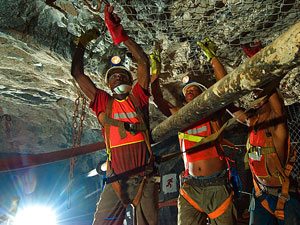
[miningmx.com] – THE South African government’s unified call for calm in wage talks, while laudable and necessary, has been sabotaged by restless unease at Lonmin which is struggling to tie the Associated Mineworkers & Construction Union (AMCU) into a recognition agreement.
Yet commentators who are close to the wage negotiation process are hopeful yet that when they kick off, an economic realism will be acknowledged in the wage negotiation process. They also think the negative social implications of a prolonged stand-off between unions and employers will also focus minds of the protagonists.
“Unions are more sensitive to broader economic conditions as well as shareholders which have been bearing the brunt of wage inflation,’ said Albert de Beer, a labour relations expert. He believes recognition agreements between Amcu and the NUM in the platinum sector are a matter of time. “There will be true democratisation in the work place,’ he adds.
Justin Froneman, an analyst for Standard Bank Group Securities said in a recent note that unions would become accustomed to accepting inflation-linked wage increases. This is notwithstanding NUM’s demands for a 60% increase for entry-level works and a blended wage increase of in the high teens.
“We believe the new normal of moderate wage increases (in line with inflation) is fast becoming a reality and that further long duration strikes are both futile and have the potential to destroy the viability of South Africa’s platinum group metal sector,’ said Froneman.
While this is good news, another study from UBS suggested that in the long term, restructuring in the platinum and gold sectors in South Africa was inevitable.
According to Kane Slutzkin, an analyst for the bank, South Africa’s platinum sector is more productive than the gold industry but the deterioration of productivity has fallen in the last three years at a great rate than in the gold sector. He believes either a massive ramp-up in mining activity, or the industry faces restructuring.
“In order to return to average productivity levels, we estimate . an increase in mining activity by 30%, which we see as highly unlikely, or reduce employment by 25%, a more likely scenario in our opinion, driven by the closure of unprofitable mines, although this is not without its challenges,’ Slutzkin said in his note.
Roger Dixon, chairperson of SRK, a mining engineering consultancy, observed however that productivity is bound to fall in these sectors owing to the maturity of the mines. “Transport to the more distant reef faces is getting longer, and it gets hotter as the mines become deeper which affects productivity,’ he said.
This is the challenge facing mines minister, Susan Shabangu, who in parliament last month set down plans for “high level engagement’ with mining industry leaders and unions in an effort to head off further civic misrule, and restore the standing of South Africa in international markets.
There were no details on what may happen but Shabangu, speaking in her budget speech, couldn’t resist a dig at the industry saying: “The societal problem that was accentuated by Marikana, as well as several other related occurrences reflect that there has been glaring lapses in the implementation of our transformation too’.
She was referring to the Minerals & Petroleum Resources Development Act, written in 2002, promulgated in 2004, and due for amendment on June 7. Shabangu believed mining companies had not done enough to enforce it.
“During this time (2004 to 2009), every other stakeholder suffered from a case of parochial amnesia in terms of their responsibility for the implementation of this transformation agenda, and we ended up with widely varied accounts on the extent, or otherwise of the progress,’ she said.
Divisions within the mining sector between stakeholders obviously run deep. A week earlier, Shabangu called on unions to join against the common enemy she termed “monopoly capital’, although as Investment Solutions head economist, Chris Hart, observed on Twitter: “There is no monopoly capital in the private sector. That is the domain of Eskom, Transnet etc.’.











